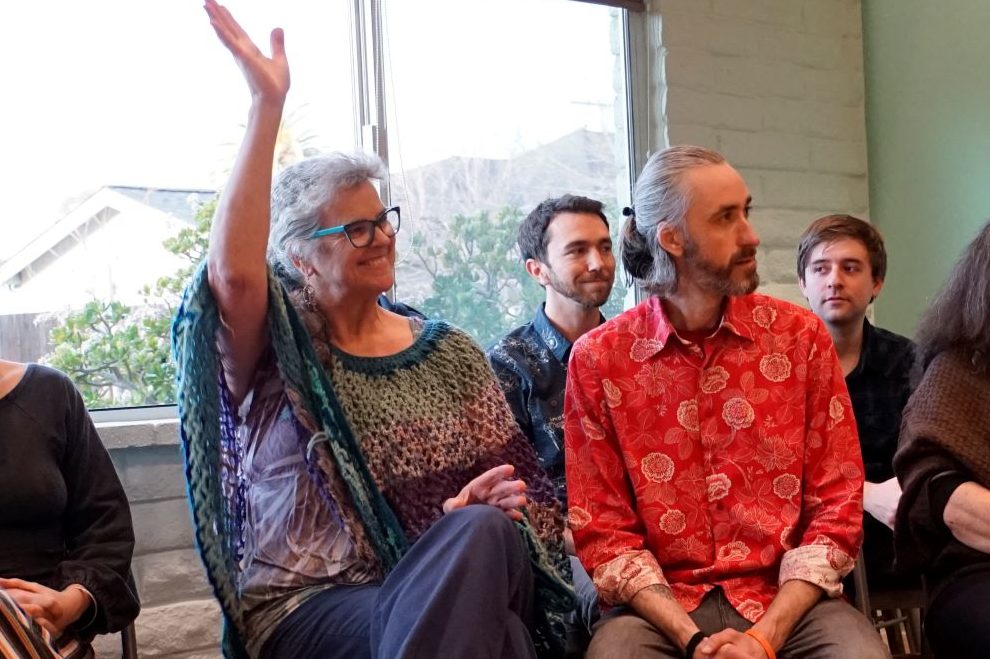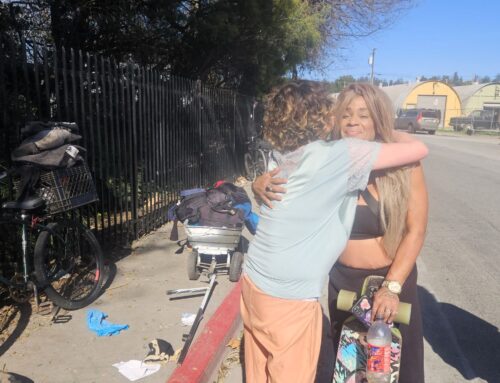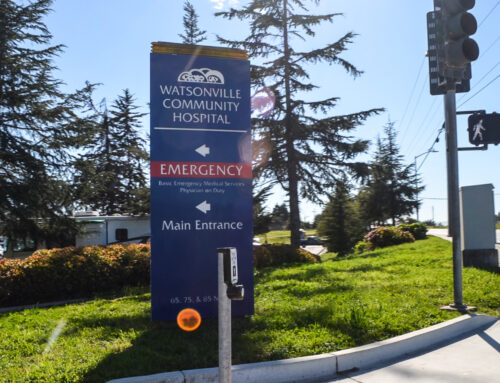Santa Cruz Local offers its news stories free as a public service. We depend on people like you — we call them our Santa Cruz Local members — to chip in $9 a month or $99 a year so vital information can be available to all. Can we count on your help?
SANTA CRUZ >> A neighborhood group and four Santa Cruz residents — including city councilmember Renee Golder — filed a lawsuit this week that alleges health and safety violations and environmental problems linked to a private needle exchange program.
The program, called the Harm Reduction Coalition of Santa Cruz County, received state authorization in August to dispense and collect syringes from people who use injection drugs. The program operates Sundays on Coral Street near River Street in the Harvey West neighborhood of Santa Cruz. Clients also can call a hotline to get home delivery and pickup of needles three days a week throughout the county, mostly at private homes, program leaders said Tuesday.
Staff and volunteers also distribute naloxone — a medication that can reverse opioid overdoses — as well as test strips to detect when drugs are tainted with fentanyl. They hand out phone numbers to connect people with medical treatment, program leaders said.
Santa Cruz City Councilmember Renee Golder, former Santa Cruz police chief Kevin Vogel, residents Melissa Freebairn and Johnny Font and the Santa Cruz neighborhood group Grant Park Neighborhood Association Advocates said the needle exchange program is a public nuisance and threat to public safety due to needle litter. They have asked a court to require that the state rescind the program, among other demands.
The Grant Park Neighborhood Association Advocates founded Grant Park Neighbors, a separate group.
The residents and group filed the 53-page complaint Tuesday in Sacramento County Superior Court, against the Harm Reduction Coalition and its founder Denise Elerick, the California Department of Public Health and its interim director, and the acting state public health officer Dr. Erica Pan.
The complaint alleges:
- The program undermines a different needle exchange program run by Santa Cruz County’s Health Services Agency. That program is run by medical professionals, housed in the county’s Santa Cruz and Watsonville clinics, and is in a better position to connect drug users with treatment, the complaint states.
- The program requires environmental review under the California Environmental Quality Act for impacts such as needle litter near schools, in parks, trash, rivers and beaches, the document states. An environmental checklist signed by a state public health department staffer was inadequate, it states.
- The needle exchange violates local laws because local land use plans do not permit needle distribution in the area, the complaint alleges.
- The Harm Reduction Coalition of Santa Cruz County is not a formal entity, but “a shape shifting collection of volunteers” and should not have received state approval to operate.
The plaintiffs’ attorneys include former Santa Cruz mayor David Terrazas, who previously wrote letters that opposed the Harm Reduction Coalition’s program.
“This is about supporting our local institutions and advocating for accountability and results. The [California Department of Public Health’s] action is divisive and drives our community towards the failed policies of the past,” Terrazas wrote in an email to Santa Cruz Local on Tuesday.
“Over the past seven years our local government has engaged in ongoing, public and transparent policy action to reduce harm to drug users, increase drug and alcohol treatment programs, and address needle litter,” Terrazas wrote. “The state’s authorization allowing [Harm Reduction Coalition of Santa Cruz County] to operate an unaccountable group of volunteers to distribute needles directly impacts the health and stability of the county program, completely undermines local policies that have been shaped through public dialogue, and will damage our communities.”
Representatives of the California Department of Public Health declined to comment Tuesday.
A 2019 report by the local advocacy group Take Back Santa Cruz showed more than 36,700 needles found in public spaces by residents, community groups and city workers from December 2012 through September 2019.
‘Unmet needs’
Harm Reduction Coalition Syringe Service Program Coordinator Dani Drysdale is one of a few paid staff for the program. Drysdale estimated that the program serves about 250 clients per year. Numbers of needles dispensed and collected would not be published until August, she said.
Though the program was approved by the state public health department in August, it has operated in different forms since 2018. Previously, it operated as a “secondary exchange” of the county’s needle exchange program, and dispensed needles in the Harvey West neighborhood on Sundays.
Elerick, the Harm Reduction Coaltion’s founder, signed up as a client of the county’s needle exchange program, though she’s not an injection drug user. The needle exchange program allows clients to exchange for others. County health services agency leaders have been aware of Elerick’s work, and have said the secondary exchange was legal.
Elerick said that her program refers clients to the county’s program regularly.
“People see us both. They see the fixed site of the county sometimes and they see us or vice versa,” Elerick said.
The county’s needle exchange is “one for one,” which means that clients can receive one clean needle for each used needle they bring, to a limit of 300. Clients bring disposal boxes full of needles, and staff estimate the number based on volume, health leaders have said.
At the Harm Reduction Coalition’s program, clients get as many needles as they ask for, regardless of how many used needles they bring. Most programs in California operate this way and the California Department of Public Health recommends a need-based policy, as studies show it cuts the number of dirty injections and rates of needle sharing. That prevents disease.
“We have a very dangerous situation if someone were to come [to] us and say ‘Ugh, all my stuff is way up in Felton and I’m not going to be down here for another four days.’ We would be doing the community harm, if we turned that person away and said, ‘You know what, you can’t have any syringes, because you didn’t bring us any,’” Elerick said.
Elerick said the program dispenses disposal boxes and encourages clients to return used needles. She said that the county’s program, because of its fixed locations, mainly serves people who can drive to the location.
“This is not a competition. This is meeting unmet needs in four corners of the county,” Elerick said.

“If you’re not able to walk or get your bike or drive to the remote locations that exist at the county syringe program, you’re out of luck. And pharmacies can sell syringes and they’re supposed to, and they do,” Elerick said. “These lawsuits are simply targeting people that are poor. They’re not targeting policy change at the state level with regards to syringe sales. They’re not concerned with people that go to pharmacies at all, to buy what they need, and not bring a syringe back at all,” Elerick said.
A November 2019 report by the county health services agency recommended expanded hours and delivery options for the county’s needle exchange program.
Drysdale, the Harm Reduction Coalition staff member, said the state health and safety code allows for the state department of public health to authorize programs to exchange needles regardless of local laws.
“It wasn’t that we were trying to override local oversight or anything. We went to the state because we’ve seen what a local program here is allowed to do. And it was leaving huge service gaps,” Drysdale said. “And the state provides a way to do a needs-based program, which Santa Cruz really needed and the state wanted Santa Cruz to have. We knew it was needed. We weren’t going to petition for a second local program that would just be part of the county program.”
As far as the lawsuit’s call for environmental review, Elerick said that studies show that areas with fewer needle exchange programs have more needle litter.
At least two studies that suggest that needle exchange programs don’t result in more litter:
- A comparison of syringe disposal practices among injection drug users in a city with versus a city without needle and syringe programs (Drug and Alcohol Dependence, 2012)
- Syringe disposal among people who inject drugs before and after the implementation of a syringe services program (Drug and Alcohol Dependence, 2019)
In October 2019, a San Diego County Superior Court judge ruled that a needle exchange program in Orange County required environmental review under the California Environmental Quality Act, due to possible needle litter. The lawsuit was filed by Orange County, the cities of Costa Mesa, Anaheim and Orange and others.
“We remove and do sweeps as per our authorization. And so I’m just curious why they chose to use this hammer to try to obstruct our work,” Elerick said. “People are frustrated with the absolute solution to syringe litter. And look, we are part of that solution.”
Listen to Santa Cruz Local’s May 2019 podcast episode on the county’s needle exchange program and an earlier private exchange proposal.
Kara Meyberg Guzman is the CEO and co-founder of Santa Cruz Local. Prior to Santa Cruz Local, she served as the Santa Cruz Sentinel’s managing editor. She has a biology degree from Stanford University and lives in Santa Cruz.





